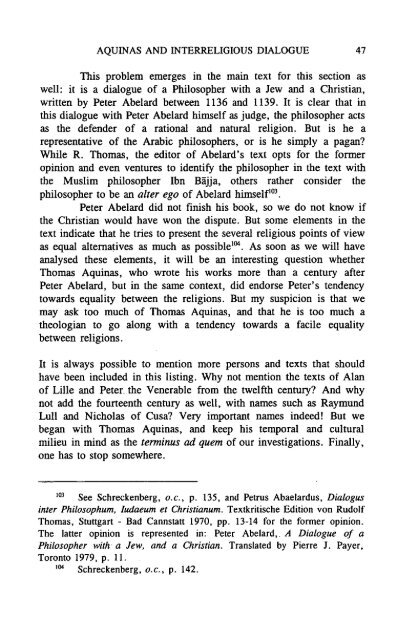Jaarboek Thomas Instituut 1997 - Thomas Instituut te Utrecht
Jaarboek Thomas Instituut 1997 - Thomas Instituut te Utrecht
Jaarboek Thomas Instituut 1997 - Thomas Instituut te Utrecht
Create successful ePaper yourself
Turn your PDF publications into a flip-book with our unique Google optimized e-Paper software.
AQUINAS AND INTERRELIGIOUS DIALOGUE 47<br />
This problem emerges in the main <strong>te</strong>xt for this section as<br />
well: it is a dialogue of a Philosopher with a Jew and a Christian,<br />
writ<strong>te</strong>n by Pe<strong>te</strong>r Abelard between 1136 and 1139. It is clear that in<br />
this dialogue with Pe<strong>te</strong>r Abelard himself as judge, the philosopher acts<br />
as the defender of a rational and natural religion. But is he a<br />
representative of the Arabic philosophers, or is he simply a pagan?<br />
While R. <strong>Thomas</strong>, the editor of Abelard's <strong>te</strong>xt opts for the former<br />
opinion and even ventures to identify the philosopher in the <strong>te</strong>xt with<br />
the Muslim philosopher Ibn Bäjja, others rather consider the<br />
philosopher to be an al<strong>te</strong>r ego of Abelard himself'?'.<br />
Pe<strong>te</strong>r Abelard did not finish his book, so we do not know if<br />
the Christian would have won the dispu<strong>te</strong>. But some elements in the<br />
<strong>te</strong>xt indica<strong>te</strong> that he tries to present the several religious points of view<br />
as equal al<strong>te</strong>rnatives as much as possible'?'. As soon as we will have<br />
analysed these elements, it will be an in<strong>te</strong>resting question whether<br />
<strong>Thomas</strong> Aquinas, who wro<strong>te</strong> his works more than a century af<strong>te</strong>r<br />
Pe<strong>te</strong>r Abelard, but in the same con<strong>te</strong>xt, did endorse Pe<strong>te</strong>r's <strong>te</strong>ndency<br />
towards equality between the religions. But my suspicion is that we<br />
may ask too much of <strong>Thomas</strong> Aquinas, and that he is too much a<br />
theologian to go along with a <strong>te</strong>ndency towards a facile equality<br />
between religions.<br />
It is always possible to mention more persons and <strong>te</strong>xts that should<br />
have been included in this listing. Why not mention the <strong>te</strong>xts of Alan<br />
of Lille and Pe<strong>te</strong>r. the Venerable from the twelfth century? And why<br />
not add the four<strong>te</strong>enth century as well, with names such as Raymund<br />
Lull and Nicholas of Cusa? Very important names indeed! But we<br />
began with <strong>Thomas</strong> Aquinas, and keep his <strong>te</strong>mporal and cultural<br />
milieu in mind as the <strong>te</strong>rminus ad quem of our investigations. Finally,<br />
one has to stop somewhere.<br />
103 See Schreckenberg, o.c., p. 135, and Petrus Abaelardus, Dialogus<br />
in<strong>te</strong>r Philosophum, ludaeum et Christianum. Textkritische Edition von Rudolf<br />
<strong>Thomas</strong>, Stuttgart - Bad Cannstatt 1970, pp. 13-14 for the former opinion.<br />
The lat<strong>te</strong>r opinion is represen<strong>te</strong>d in: Pe<strong>te</strong>r Abelard, A Dialogue of a<br />
Philosopher with a Jew, and a Christian. Transla<strong>te</strong>d by Pierre J. Payer,<br />
Toronto 1979, p. 11.<br />
104 Schreckenberg, o.c., p. 142.








